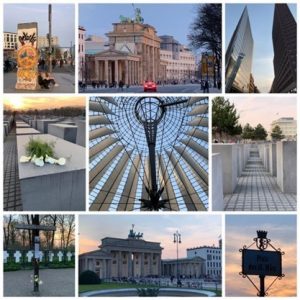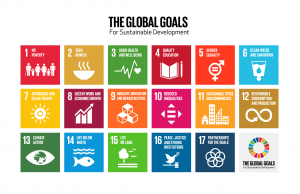If you are a student with an interest in popular arts and culture, societal developments and international journalism and media, this is the programme for you! Training in reporting, research and design thinking are part of your programme.
You will join an intercultural classroom and work together with other students on cultural stories and creative media, within a newsroom setting. If you are eager to share your own skills and knowledge with other students and contribute to an interdisciplinary team, sign up for Cultural Journalism and become a creative international reporter.

Study and reporting trips in Europe are part of your programme. If you are looking for an extra challenge: this programme offers elective options on honours level, rewarded with a HU star certificate for excellence.
Admission
This programme runs in an intercultural classroom with students from study programmes in the Netherlands and from international partner universities. It therefore has an intake procedure.
All applicants need to fill out an entry form and supply information on study background, level of English and personal motivation. This also helps us to organize interdisciplinary and intercultural learning, journalism skills training and groups assignments. Please use this link and send your documents to the email-address included.
Prior experience in journalism, media studies or communication is an advantage, as is knowledge of (international) arts and culture. But they are not a requirement, motivation and commitment are equally important. Your level of English should be at least B2, supported by TOEFL, IELTS or any other proof of proficiency in English.
NOTE: registration in Kies op Maat and HU-minors is not enough, you will not be admitted to this programme without an intake! Make sure you have this covered before the deadline.
The Examination Board determines which minors do not have a higher professional education level and/or have an unacceptable overlap with the compulsory curriculum of your own study programme. Check at the page Not allowed minor courses under your institute which minors are not allowed. This page will be updated from 29 February 2024 for the 2024-2025 minor offer.
Content
Cultural Journalism is a challenging international programme at the Utrecht School of Journalism. Students from study programmes in the Netherlands will have the opportunity to join students from countries all over the world in our intercultural classroom. Note that CuJo is an integrated programme, there are no stand-alone courses, everything is interlinked to train you to become a creative international reporter..
The programme has two major tracks: Newsroom and Media Lab.
The Newsroom has a main focus on journalism skills, research and cross-media storytelling. It therefore contains tutorials about: popular culture, arts, identity and lifestyle, globalisation and creative cities to serve as a body of knowledge for your stories. Training in journalism skills covers all platforms and genres, and is tailored to support your level and ambitions.
The Media Lab focuses on the international media landscape, concept development, creativity and innovation. You will work in a project team for a work field client. Your supporting tutorials and workshops cover design oriented and practice based research, design thinking methodology and team work skills.
Cultural Journalism is offered on bachelor level with honours level options, through more complex assignments and personal achievements. Participation in honours is not mandatory.
Honours level is rewarded with HU-honours stars.
Learning objectives
1. News gathering and research
Selecting topics and contextualising journalistic topics on international and/or European level, based on your own journalism research, including the use and analyses of data (qualitative and quantitative).
2. Journalism Production
Producing a complex, cross media production.
3. Accountability and the public
Building relationships with the public and/or diverse target groups. Accounting for journalism conduct in the public and professional sphere.
4. Entrepreneurship and Innovation
Developing a journalism concept on the basis of practice based and design oriented research. Devising a business plan for the production and sale of a journalism production/story.
5. Practice based research and Reflection
Conducting a research into a media/journalism related issue or trend by means of practice based research.
Note: These competences follow the Tartu Qualification Profile 2020 published by the European Journalism Training Association (www.ejta.eu).
Competences for honours level follow the profiles of the Excellent Professional as defined by the HU University of Applied Sciences Utrecht, applied for Journalism and Media Studies: Reflective practitioner, Global professional, Inspiring leader, Entrepreneur, and Digital creative.
Honours level is defined by a higher level of complexity, a broader scope (multidisciplinary) and autonomous professional conduct, in line with the Dublin Descriptors, level 6+ (bachelor with honours). Students can choose their competencies to work on within the framework of the profiles.
Courses
Newsroom (15 EC) – for more information see Content
Media Lab (15 EC) – for more information see Content
NOTE: this is an integrated programme, training you to become an international reporter in the field of cultural journalism, it is therefore not possible to take only some courses and skip others. Active participation in all classes is required, attendance of the newsroom, group work and excursions/field trips are mandatory.
The programme requires a study input of at least 30 hours per week and offers all kinds of excursions and field trips, in the Netherlands and Europe.
Assessment
Different forms of assessment are in place to help you develop your skills and knowledge throughout the semester, and achieve the learning outcomes in the end. Both tracks have a final assessment consisting of cross-media productions, research reports, a project pitch and project report.
Literature
- John Story, Cultural Theory and Popular Cultura, Routledge 2021.
Schedule
Students that are admitted into the programme will receive the study guide before Christmas. The final time table will be ready by mid-January. This is a full time programme with 3-4 days on-campus education. Active participation is required.
With the exception of the first teaching period of the academic year (starting September), the lesson and test schedules are always posted on Mijn Rooster four weeks before the start of each teaching period. The schedule for the first teaching period of the academic year can be found on the site three weeks before the start. The most up-to-date schedule is always visible on Mijn Rooster.
At HU, full-time education may be scheduled between 08:30 and 19:00.
Additional costs
A 4-day fieldtrip to Berlin is part of the programme and will cost approximately:
- Hostel: 35 euro per night, excluding breakfast (4-5 nights)
- Travel: depending on train, flixbus or plane to Berlin approximately 75-200 euros
- Meals: own choice
You will not need a visa for Germany, as Germany is a Schengen-country, but you have to bring your passport or ID-card. You will have to submit passport information to the coordinator in order to book visits/excursions.
The cost for your cross-media production (reporting trip) depends on your country of destination. You always have the option to pick a topic in the Netherlands with few additional costs.

This minor course is marked by the Green Office as a sustainable minor. This means that by participating in this minor course, you can contribute to one or more of the Sustainable Development Goals from the UN.